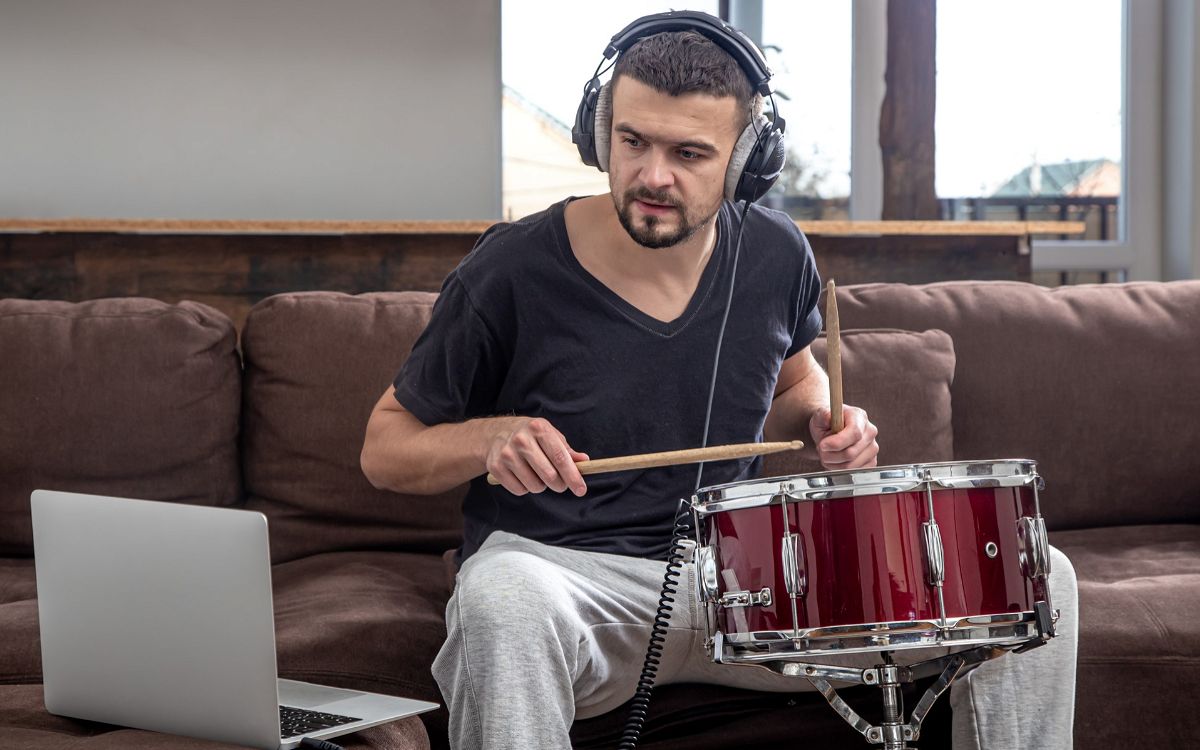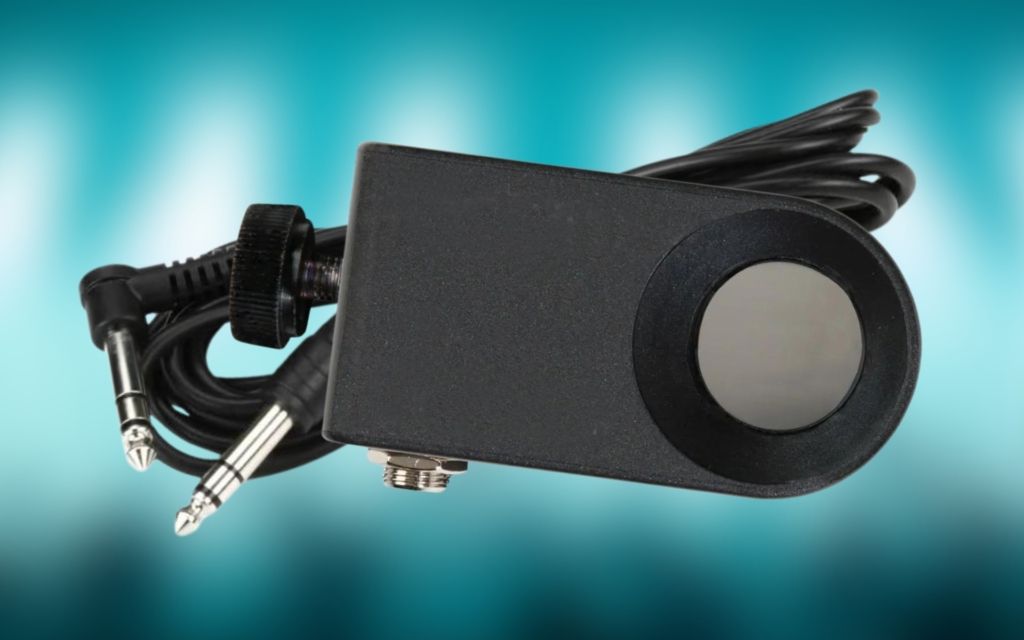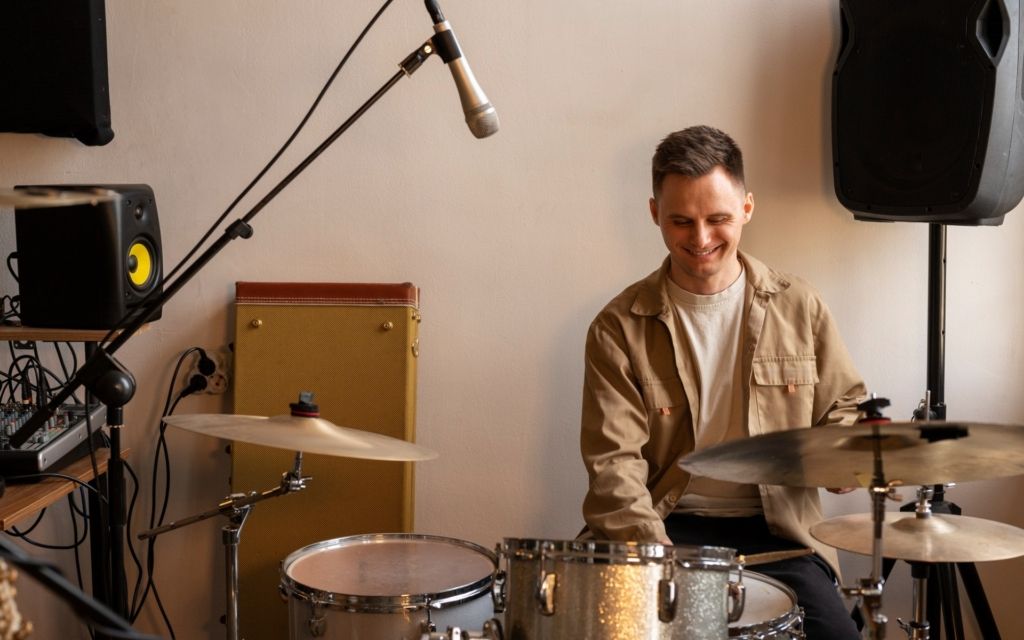How many hours does it take to learn the drums? That’s something that most beginners ask so that they have an idea of how long it will take for them to get good at the instrument. There’s no set answer, as it solely depends on how much you practice.
Beginner drummers should practice for at least 15 to 30 minutes every day to work on all the basics. Experienced players should aim to have drum practice sessions for an hour or more each day to iron out more complicated concepts.
Answering how many hours of deliberate practice you need is quite complicated, so we’re going to look at all the aspects in this guide.
We’ll look at practice ideas, practice schedules, and I’ll help you understand why you should practice for certain periods at a time.
Contents
The Best Way to Practice Drums

Drumeo is an online drumming platform and drum app that offers the best drum education you can get.
The best way to learn drums is to stay motivated with a good routine and to be provided with a clear learning direction and path for development. Drumeo offers just that.
You can learn from anywhere, and fit it around your schedule. It has everything you need to improve as a drummer, and I can almost guarantee you’ll learn more and develop your playing abilities faster.
Drumeo takes the guesswork out of drum practicing, with awesome lessons and a progression system that provides a sense of reward and fulfillment, as well as enjoyment, as you improve on the drums.
You can get started with Drumeo with a free trial for 30-days by clicking the image below.

Everything this article will cover, including staying motivated, setting goals, and knowing what to practice, is all taken care of with Drumeo.
How Long Should You Practice Drumming For?
As a drum teacher, I’d suggest practicing for 30 minutes to 1 hour each day. However, the amount of time a drummer should dedicate to practicing can be influenced by several factors including the following:
Age
Younger learners have shorter attention spans and will benefit from shorter, more frequent practices. For example, 15-30 minutes daily would work well for kids. Teenagers and adults, with longer attention spans and higher levels of commitment, could aim for 45-60 minutes or more per day.
Skill Level
Beginners should start with shorter daily sessions (about 30 minutes) to prevent overwhelm and build a solid foundation. As skills improve, practice time can increase. Intermediate drummers might aim for 45-60 minutes daily, while advanced drummers could go for 1-3 hours.
Musical Goals
Casual drummers might find 30-60 minutes of practice sufficient. However, those aspiring to be professionals or who are preparing for performances or auditions might need to put in several hours daily.
Time Availability
Realistically, not everyone has hours to devote to daily practice. It’s better to have consistent, focused practice for a shorter time than irregular long sessions. Even 15-30 minutes of quality practice daily is beneficial.
Physical Stamina
Drumming can be physically demanding, and everyone has different levels of fitness and stamina. It’s worth taking regular breaks during longer practices to avoid fatigue.
Learning Style
Some people learn quickly, others more slowly. Adjust your practice time to your learning pace. If you’re a slow learner, don’t rush. Take the time you need to master each skill before moving on to the next.
Important Aspects of Practicing Drums

Building Muscle Memory
Drumming involves a lot of complex movements that need to be executed with precision and speed. By consistently practicing, your muscles learn these movements naturally and can perform them more accurately and effortlessly over time.
Building muscle memory is one of the most important aspects of drum practice. Each practice session builds upon the previous one, helping you to gradually increase your speed, fluidity, power, and control.
Developing a Schedule
Developing a drum practice schedule is one of the most helpful things you can do for your drumming. Sticking to that schedule will allow you to allocate a certain amount of time, and then you can work within that to get the best results possible.
If you practice without a schedule, your practice times won’t be as organized, and the chances are high that you won’t improve as much as you would if you stuck to a drummer practice time outline.
A schedule will also give you an idea of how long something will take to learn. If you limit yourself to learning something within an hour, you’ll be more motivated to do it.
Setting Goals
Setting goals gives you a clear path of what you need to do when you practice drumming. You should fit whatever you want to learn into your practice schedule. Depending on the difficulty, you’ll be able to assume how much time it will take up in your sessions.
Those goals will typically come from drum lessons, and they are crucial to becoming a great drummer.
You should set short and long-term goals.
Short-term goals will be able to be achieved after one or two practice sessions. Long-term goals will require a lot more work, and those will be the difficult concepts that you will work on for a few minutes in every practice session for months. Knowing these will give you a further idea of how long you should be practicing.
Having the Right Equipment
If you want to boost your results from practicing the drums, you should set up an environment that is free from distractions and that has all the equipment you need at arm’s reach.
This includes a metronome, headphones, and something to play music through.
Your practice session will be more action-packed if you don’t spend time looking for these things and setting them up.
You should also have something to video yourself so that you can watch yourself and see what you need to work on from a viewer’s perspective.
If you really want to get techniques right, having a mirror in your practice room is also a huge help, especially for ensuring you maintain a good drumming posture.
Staying Motivated
The last important aspect of practicing is staying motivated. If you develop a schedule, set goals, and have all the right practicing equipment, motivation is what will boost your results no matter how long you practice every day.
The best way to stay motivated is by practicing when you’re not at your drum set. You can do this by actively listening to songs you want to learn or by watching your favorite drummers and getting inspired to get to their level.
Setting Practice Times
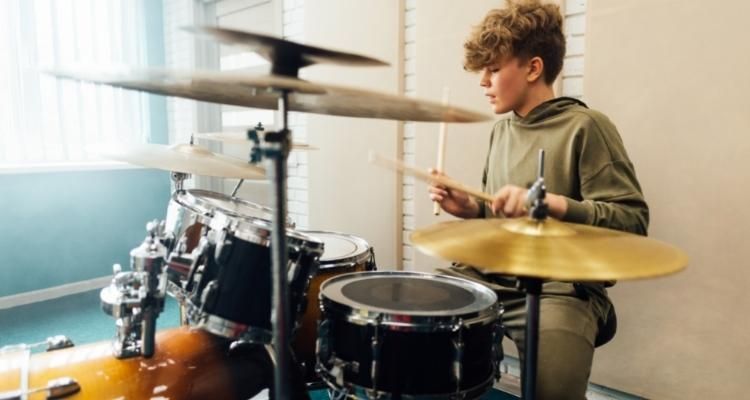
Beginner Drummers
If you’re new to drumming, you shouldn’t practice for very long every day. It’s a very physical instrument, and your body needs to get accustomed to playing at first.
The golden amount of practice time for a beginner drummer is half an hour every day.
It’s short enough to keep you from getting fatigued but long enough to allow you to work on a few different things.
If you block 30 minutes of daily practice on the drums, you’ll see results quite quickly. If you’re motivated to have longer practice sessions, just make sure that you’re working closely on technique and playing the drums in the most optimal way.
Work on everything that you’ve been going through in your paid drum lessons, and be sure to repeat everything often to get it right.
Experienced Drummers
If you’re more experienced on the drums, you’ll have a much wider skillset, and that means that you can work on more things in your practice sessions.
Most drummers claim that an hour is a good amount of time to work on things and feel accomplished afterward. Practicing for an hour every day will give you a lot of time to develop new skills and ideas.
60 minutes is also a round amount of time that allows you to neatly section things off. You could practice six concepts for ten minutes each.
With that being said, you should practice for more than an hour if you have the time for it. The more you practice, the better you’ll get. But practicing for an hour every day is where most drummers see a lot of growth.
Many experienced drummers still take drum lessons, but you can also find lots of new concepts and techniques to practice when looking online.
How Much is Too Much?
This depends on the person, but you’ll know that you’re practicing the drums too much when your hands start getting injured or if you burn out.
You have to find the sweet point of motivation combined with stamina. Most drummers who study drumming at colleges and universities practice for countless hours every day, while a lot of professional touring drummers don’t practice at all.
It all depends on your circumstances but if you practice drums for many hours a day, you will most likely get set back in other areas of your life. So, it’s not recommended.
You should have fun practicing and not see it as a chore.
Drum Practice Plan Ideas
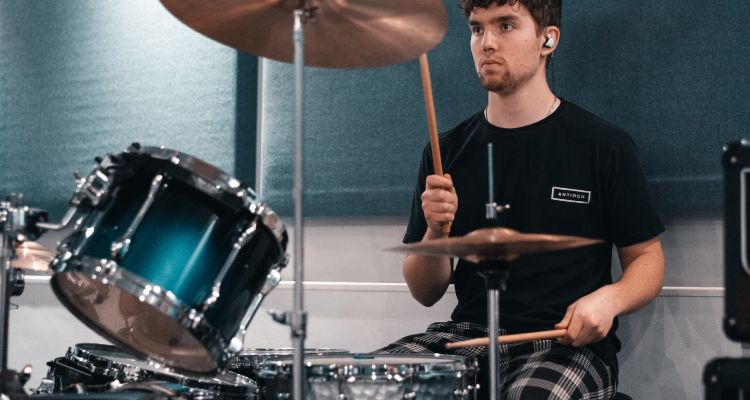
Here are two examples of a practice regimen that will help you set goals and stick to schedules. If you find you have time, you can double them up and add extra things to work on. Both these routines will allow you to work on whatever you’ve been going through in drum lessons.
30 Minutes
If you’re a beginner, you should mainly work on grooves, drum rudiments, fills, bass drum speed, hand speed, and timing. You could do some rudimental practice but playing rudiments for too long will be quite boring.
Here’s a beginner drum practice routine:
5 minutes – Play single strokes, double strokes, and single paradiddles as a warm up.
10 minutes – Work on grooves or fills that you’re learning from a teacher or online lessons.
10 minutes – Play drums to a few songs.
5 minutes – Improvise on the drums by playing everything that you can as a cool down.
60 Minutes
As an experienced drummer, you’re more likely to sit on the kit and improvise from the beginning. You should get that out of your system at the beginning of every practice session and then move on from there.
Here’s a structured 60-minute deliberate practice schedule idea to stick to:
10 minutes – Open drum solo and improvisation.
10 minutes – Warm up by working on drum rudiments and technique.
20 minutes – Work intently on a concept that you want to improve at such as bass drum speed, or improving your left hand.
20 minutes – Jam to songs and have fun to end off your practice session.
Wrap Up
So, how many hours should a drummer practice? It depends on who you are, how much time you have, and what goals you want to achieve.
The more you practice, the better you’ll get, so it’s better to practice as much as you can. After all, great drummers have fantastic natural ability, but they also work exceptionally hard by practicing for many hours to improve their skills.
However, a focused one-hour session of mindful practice will give better results than if you were to play around with no goal in mind for a few hours.
That’s why a dedicated 30 minutes is great for a beginner or an average drummer, and one or two hours a day is ideal for experienced drummers.
Also, remember that simply having fun playing drums always counts as practicing. If you play all the time, your skills will improve. This works because you build valuable muscle memory that retains information and good habits.
Practice makes permanent, and that’s something you should think about whenever you work on developing your skills on your musical instrument.

